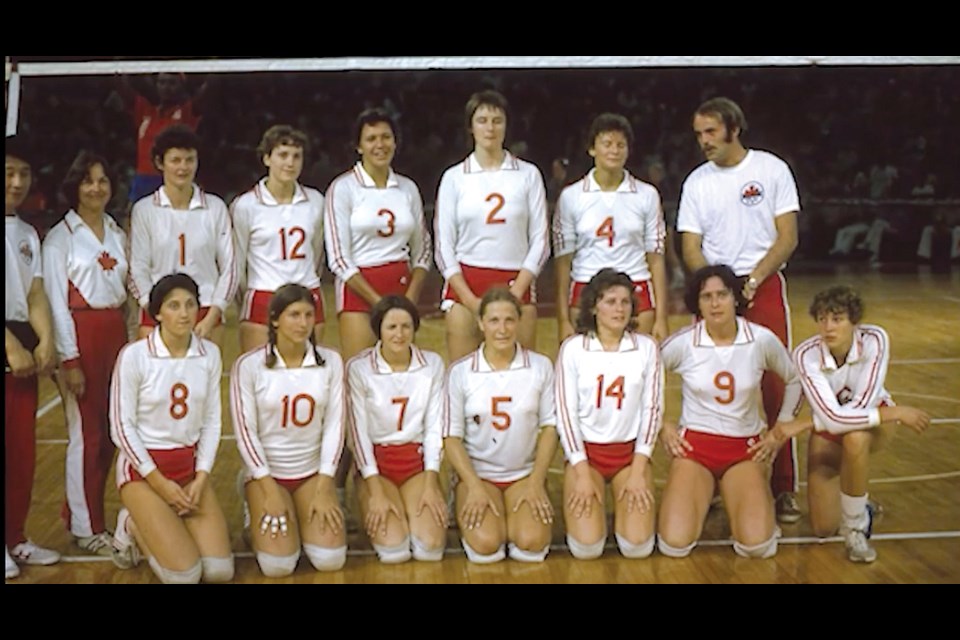Olympian and former Canadian national team head coach Betty Baxter of Roberts Creek was inducted into the Volleyball BC Hall of Fame Feb. 17.
The honour marks a 180-degree reversal in how LGBTQ2+ athletes have historically been recognized, after Baxter was fired from her position as head coach of Team Canada because of rumours about her sexual orientation.
Baxter, 68, alluded to that rejection in an interview with Volleyball BC about her induction, saying last week’s recognition wasn’t simply a mark of her athletic achievements: “It’s really an honour to have my first sport that I was really deeply involved in come back and say, ‘Hey, you’re OK.’”
The athlete was a dominant force in Canadian women’s volleyball from the 1970s to early 1990s. Raised in Brooks, Alta., Baxter’s high school coach initially rejected her when she tried out for the sport, but eventually championed her talents.
She competed for the UBC Thunderbirds, earning two consecutive National Interuniversity Sport titles and in 1974 was named B.C.’s University Athlete of the Year, according to her hall of fame biography.
Former coach Art Wilms described Baxter as a “coach’s dream,” due to her love of the game, insatiable desire to learn and “incredible physical talent,” while teammate and Olympian Carole Bishop said Baxter “hit the ball harder than anyone else.”
In her induction speech – streamed on Zoom – Baxter thanked her family, past teammates and coaches, including Moo Park, who trained the national team.
As captain, Baxter led Team Canada at the 1976 Olympic Games in Montreal – the first Canadian women’s volleyball team to compete at the Olympics.
Baxter also excelled as a coach at University of Alberta and then University of Ottawa, where in 1980 she was named Canadian Interuniversity Athletics Union (CIAU) Women’s Volleyball Coach of the Year after taking the team to a second place finish at the CIAU Championships.
A capstone achievement came in 1979 when she was named head coach of the National Volleyball Program – the first woman and Canadian to do it, according to Volleyball BC.
“I took the responsibility so seriously, as was required,” said Baxter in her speech.
But at the pinnacle of her career, 19 months into her position, Baxter was dismissed without cause by Volleyball Canada – a fact not mentioned in the hall of fame biography, but which Baxter referenced in her induction speech.
“The seriousness is why it was so crushing to be fired from the job as national coach,” said Baxter. “And to be fired among rumours, not about the job I was doing, but who I was.”
A year-long coaching apprenticeship and other investments by the organization weren’t enough “to counter the fear that a lesbian was in charge of the program.”
The same day she was fired, she was writing a constitution that would later form the basis of the Canadian Association for the Advancement of Women in Sport. Baxter would also co-found the National Coaching School for Women.
After a three-year hiatus she re-entered the sport as a coach for women’s club teams in Vancouver and served as board member and spokesperson for the 1990 Vancouver Gay Games.
In 1986 – the same year LGBTQ2+ rights were enshrined into federal law – Baxter took gold at the San Francisco Gay Games and silver in the 1990 Vancouver Gay Games.
“By that time I was ready to thank the Canadian Volleyball Association for firing me, as I’d found my calling as an activist and teacher,” she said.
At the induction, Baxter also thanked Volleyball BC for giving “me the honour of entering the hall of fame fully visible as who I am.”
Last year BC Volleyball adopted a Pan-Canadian policy on diversity, equity and inclusion that also applies to Volleyball Canada, and which replaced Volleyball BC’s Gender Equity policy, which came into effect around 2010, director of operations Adrian Goodmurphy told Coast Reporter. According to Baxter, Volleyball Canada has never formally acknowledged her firing.
Outside of volleyball, Baxter has been active on the Sunshine Coast, chairing the board of School District No. 46 and serving as trustee until 2017. She subsequently underwent treatment for ovarian cancer and has fully recovered.
Currently, Baxter is working on a poverty reduction strategy for the Sunshine Coast through the Resource Centre.
She was also featured in the book Proud to Play by Erin Silver, about Canadian athletes who use their platforms to push for LGBTQ2+ equality. It was published in January.



